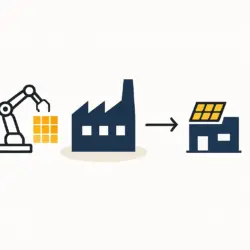Indian Scientists Unveil Scalable Breakthrough in Solar panel recycling
Indian scientists have developed a new method to recycle solar waste, addressing the growing challenge of managing end-of-life photovoltaic (PV) panels. This scalable process not only recycles valuable materials but also reduces the environmental impact of solar waste, paving the way for a truly circular solar economy.
A Breakthrough in Solar Waste Recycling for Solar panel recycling
As the global demand for solar energy soars, so does the inevitable mountain of solar waste. The International Renewable Energy Agency (IRENA) estimates that by 2050, up to 78 million tons of solar PV panels will need to be decommissioned globally. This challenge is particularly acute in India, a country that has achieved extraordinary milestones in renewable energy capacity and saw a 25% year-on-year surge in solar power generation in the first half of 2025. This rapid growth means a sharp increase in solar waste is on the horizon.
To tackle this impending issue, researchers at India’s MIT World Peace University (MIT-WPU) have developed an innovative and scalable process to recycle solar waste efficiently. Their breakthrough focuses on a comprehensive approach that recovers valuable materials from retired panels and converts the remaining waste into useful byproducts. This method is a crucial step toward sustainable solar energy and establishing a robust circular economy.
How the Solar panel recycling Process Works
The new recycling method involves a series of sophisticated chemical and mechanical steps to cleanly separate the various components of a solar panel. The solar panel manufacturing process assembles layers of glass, polymers, silicon cells, and metals, which must be carefully deconstructed. The first step in this recycling method is to remove the aluminum frame and glass cover.
These components are then processed to extract high-value materials. A chemical treatment helps dissolve and separate silicon and silver, allowing them to be purified for reuse. A key innovation of this process is its commitment to zero waste; residual materials that cannot be directly reused are converted into construction products, preventing them from ending up in landfills. The researchers’ results are promising, showing recovery rates of up to 95% for silicon and 85% for silver, making the process highly efficient and commercially viable.
Environmental and Economic Benefits of Solar panel recycling
This new recycling method offers significant environmental and economic advantages. By recovering materials from old panels, the process reduces the reliance on mining and processing new solar panel raw materials. This not only conserves finite natural resources but also significantly lowers the carbon footprint associated with producing new solar panels.
Economically, the recycled materials can be sold back into the market, creating a new revenue stream and a strong business case for recycling. This will encourage more investment in the sector, fostering a sustainable industry that supports the growth of renewable energy. Projections show that the global solar panel recycling market is projected to reach USD 857.8 million by 2035, and with its ambitious solar targets, India is well-positioned to become a major player.
Government Support and Future Prospects for Solar panel recycling
The Indian government is already taking proactive steps to manage solar waste. In 2022, the Ministry of New and Renewable Energy (MNRE) announced a policy framework for managing solar e-waste, and this new recycling method from MIT-WPU could be instrumental in its implementation.
Furthermore, the government’s push for self-reliance in photovoltaic technology, including a mandate for clean energy projects to use locally produced cells from June 2026, will boost India solar cell manufacturing. This makes a domestic recycling solution even more critical for securing the supply chain.
The MIT-WPU research team is now working to scale up their process for commercial application. They are collaborating with Indian companies to build pilot plants capable of handling larger volumes of solar waste. If successful, these facilities could serve as a model for similar plants worldwide.
As the world transitions to renewable energy, managing the lifecycle of green technologies is paramount. This innovation from India is a significant leap forward. By turning waste into a resource, it supports a sustainable and circular economy. For energy consumers everywhere, including homeowners and tenants in Germany, such breakthroughs in major solar markets are vital as they help stabilize global supply chains, reduce the environmental impact of renewables, and ensure the long-term sustainability of our shared clean energy future.
If you want to learn more about the intricacies of solar panel production, from raw materials to finished modules, check out our free e-course on the basics of solar panel manufacturing.


